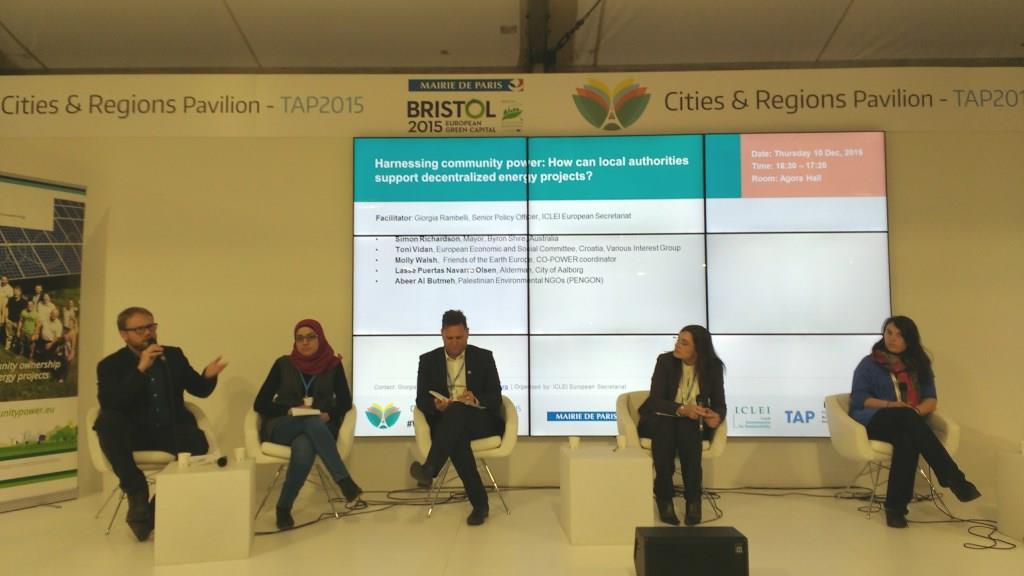European Green Capitals: “Look to the Future, and Be Brave!”
Winners of the prestigious European Green Capital award convened at a session at the Cities & Regions Pavilion – TAP2015 at COP21 on Tuesday, 1 December.
Entitled “European Green Capitals: The Winners Debate”, the session gave representatives of previous and current winning cities – Stockholm (2011), Hamburg (2012), Copenhagen (2013), Nantes (2014), Bristol (2015), and Essen (2017) – the chance to explain and discuss their varied strategies for reducing greenhouse gas emissions. The session was facilitated by the Daniel Calleja, Director General of the European Commission’s Directorate-General for Environment, who opened by highlighting the role of cities as drivers of innovation.
In short presentations, cities shared their major lessons from the award years. The speakers were Katarina Luhr, Vice Mayor of Stockholm; Jens Kerstan, Senator for Environment and Energy, Hamburg; Morten Kabell, Mayor of Technical and Environmental Affairs, Copenhagen; Fabrice Roussel, Vice Mayor, Nantes; George Ferguson, Mayor of Bristol; and the Angelika Siepmann, Chief Environment Officer of Essen, the incoming European Green Capital for 2017.
Stockholm spoke about the inspiration for its goal of becoming fossil fuel-free by 2040 and its full compliance with the Compact of Mayors. Hamburg emphasized its progress on renewable energy, stating that “representatives and politicians come and go but the aim remains the same.” Nantes learnt from its year as European Green Capital that it is highly important to work with a range of stakeholders (citizens, businesses, and so on), and to show that sustainability initiatives benefit all.
Copenhagen explained that its motto for the year, “Sharing Copenhagen”, applied to everyone and meant “sometimes even sharing failures” to ensure that cities “don’t reinvent the wheel” on sustainability initiatives. Actions like cycling must also be made the easiest choice for citizens, he added.
Bristol emphasized that while targets and technology were important, the European Green Capital award was about “peoples and partnerships” – among civil society, with schools, with businesses and with other cities. “Recognizing that we cannot work in isolation,” he added, “is absolutely vital”. Essen stated that the city is a model for achieving major changes on a small budget. Essen’s experience showed how synergies between mitigation and adaptation were possible, as in the Emscher stream conversion project.
The presentations were followed by an engaging discussion between the Mayors and with the audience, which covered a range of key themes and challenges for sustainability and climate change action in cities.
The audience raised the importance of linking cities with their hinterlands and addressing the question of who feeds the city? Actions such as installing city-regional food councils, increasing local, seasonal and organic food in municipal kitchens and encouraging urban agriculture were mentioned, as well as the need to be creative to overcome the barrier of EU procurement rules that force public authorities to choose the cheapest rather than the best solutions.
When asked about the main barriers to creating sustainable cities, the European Green Capital Mayors seemed to agree that the lack of collaboration within City administrations as well as with other actors – the “siloing” of issues in separate isolated sectors – is a major obstacle. In addition, when local governments do not have the legislative autonomy to take decisions, act and manage budgets in some areas, the entire policy suffers. Therefore, cities call for devolution and autonomy from their national counterparts.
Hamburg said: “we want legislation that won’t hinder us, but will help us go forward on the road to tackle climate change”. This was complemented by the final appeal to the COP21 by Nantes for the nations to “learn from successful solutions at the local level.”
When asked about addressing the economic and employment impacts of “greening” cities, Copenhagen pointed out that “it is a myth that green is expensive”; green policies can create jobs and be an element of successful economic transitions from heavy industry, as Essen’s experience shows. Collaborating with businesses has been enormously fruitful for the Green Capitals, with Hamburg suggesting that the way to go is “combining strict national level government legislation with voluntary commitment and actions from the private sector”.
Three young Climate Ambassadors from Copenhagen were present and asked all the Mayors if they are engaging the youth enough, and – could they do it more?
The Mayors agreed that listening to their city’s future residents is imperative as they often come up with ideas and solutions that are better than those of their older counterparts. Building cities for the future “cannot just be for youth, it has to be with them”, which is why Bristol, for example, has an elected Youth Council and Mayor Ferguson has two Youth Counsellors (one female, one male).
The discussion ended with strong messages from the Mayors to COP21, concluding on Stockholm’s appeal to “look to the future and be brave!”
About the European Green Capital Award
The European Green Capital Award was launched in 2008 by the European Commission (EC) to enable local authorities within European cities to make tangible progress in raising their environmental status, while also rewarding their commitment to urban sustainability. The award was designed to give recognition each year to one city going above and beyond to improve its urban environment and living standards.



